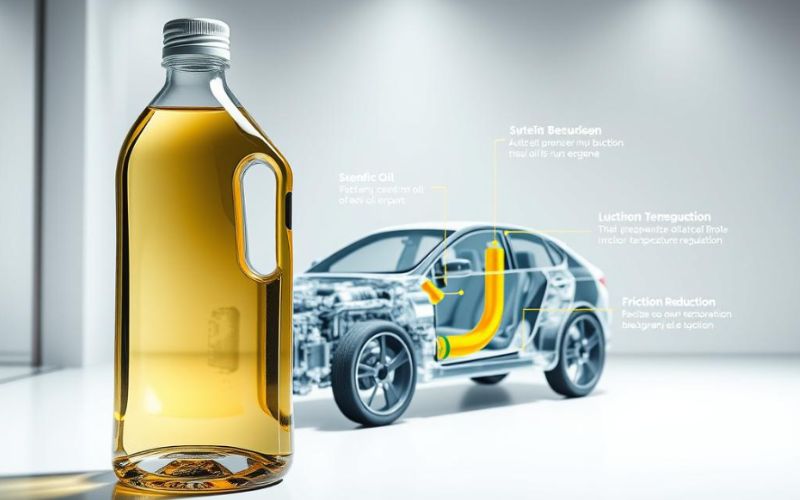Choosing the right engine oil is key for your car’s health. There are many options, making it hard to pick between synthetic and conventional oil.
The right oil affects your car’s fuel use, engine wear, and health. As a car owner, picking the best oil is important for your vehicle.
Topic Summary
- Understanding Engine Oil Basics
- Synthetic vs Conventional Engine Oil: Key Differences
- Performance Comparison: How Each Oil Type Affects Your Engine
- Practical Considerations For Vehicle Owners
- Conclusion: Making The Right Choice For Your Car
- FAQs on Synthetic vs Conventional Engine Oil
- What is The Main Difference Between Synthetic and Conventional Engine Oil?
- Which Type of Engine Oil is Better For My Car: Synthetic or Conventional?
- Can I Switch From Conventional Oil to Synthetic Oil in My Vehicle?
- How Often Should I Change My Engine Oil, and Does it Differ Between Synthetic and Conventional Oil?
- Will Using Synthetic Oil improve My Vehicle’s Fuel Economy?
- Is Synthetic Oil Worth The Extra Cost Compared to Conventional Oil?
- Can Synthetic and Conventional Oil Be Mixed?
Key Takeaways
- Understand the differences between synthetic and conventional engine oil
- Learn how the right oil can impact your car’s performance
- Discover the benefits of choosing the correct oil for your vehicle
- Find out how to determine the best oil for your car’s specific needs
- Make an informed decision for your car’s maintenance and longevity
Understanding Engine Oil Basics
Engine oil is key for your car’s engine to run smoothly. It affects how well your car works and lasts. It keeps your car healthy in many ways.
What Engine Oil Does For Your Vehicle
Engine oil makes moving parts in the engine run smoothly. This reduces wear and tear. It’s important for the engine to work well and last longer.
It also cools the engine and cleans it by removing dirt. Plus, it makes your car use less fuel by cutting down on friction.

Types of Engine Oils Available Today
There are two main types of engine oils: conventional and synthetic. Conventional oil comes from petroleum and works for most cars. Synthetic oil is made to perform better in extreme temperatures and lasts longer.
Knowing the benefits of synthetic oil helps choose the right one for your car. This depends on how you drive and your car’s needs.
When picking engine oil, think about your car, how you drive, and what you want from maintenance. Whether you choose conventional or synthetic, make sure it fits your car’s needs. This ensures your car runs well and lasts long.
Synthetic vs Conventional Engine Oil: Key Differences
Engine oil is key for car care. Knowing the difference between synthetic and conventional oil is important. It helps you pick the right oil for your vehicle.
Composition and Manufacturing Process
Conventional oil comes from petroleum. Synthetic oil is made from chemicals. A top car expert says synthetic oil works better in extreme temperatures and lasts longer.
Conventional oil is made by refining crude oil. This can lead to quality differences. Synthetic oil, though, is made to be consistent. It offers better lubrication.
Viscosity and Flow Characteristics
Viscosity shows how well oil flows. Synthetic oils stay consistent in temperature. This means better engine protection. Conventional oils can get too thick in cold and too thin in hot, hurting engine performance.
Additives and Chemical Properties
Both types of oil have additives to improve their performance. But synthetic oils have more advanced additives. These offer better wear protection, corrosion resistance, and fuel efficiency.
Knowing these differences helps car owners choose the right oil. Whether it’s synthetic or conventional, the choice depends on your car’s needs.
Performance Comparison: How Each Oil Type Affects Your Engine
It’s important to know how synthetic and conventional engine oils work. They affect your car’s engine in different ways. We’ll look at how each type performs in various areas.
Engine Protection and Wear Reduction
Engine oil protects your engine. Synthetic oil is better at this than conventional oil. It keeps engine parts safe in extreme temperatures.
Conventional oil works well too. But synthetic oil is better in harsh conditions. This can make your engine last longer.
Temperature Tolerance and Extreme Conditions
Synthetic oil works well in all temperatures. It keeps engine parts well-lubricated. Conventional oil might not work as well in very cold or hot temperatures.

Engine Cleanliness and Deposit Formation
Both oils have cleaners that prevent deposits. Synthetic oil is better at keeping engines clean. Cleaner engines run better and last longer.
Fuel Economy and Emissions Impact
The oil you use affects fuel economy and emissions. Synthetic oil is better for fuel efficiency. It also helps reduce emissions by keeping the engine clean.
| Performance Aspect | Synthetic Oil | Conventional Oil |
| Engine Protection | Superior wear protection | Effective but may not match synthetic oil in extreme conditions |
| Temperature Tolerance | Performs well in a wide temperature range | May become too thick or too thin in extreme temperatures |
| Engine Cleanliness | More effective at keeping engines clean | Contains detergents and dispersants but may not be as effective as synthetic oil |
| Fuel Economy | Can improve fuel efficiency | May not offer the same level of fuel efficiency improvement |
Practical Considerations For Vehicle Owners
Choosing between synthetic and conventional engine oil depends on several factors. We’ve talked about the differences. Now, let’s see how these differences affect your choice.

Cost Analysis: Initial Price vs Long-Term Value
Cost is a big factor for car owners. Conventional oil is cheaper at first. But synthetic oil might save money in the long run because it lasts longer and can improve fuel efficiency.
“The key to making a cost-effective decision is understanding the total cost of ownership, not just the initial price.”
Automotive Research Association
When looking at the total cost, think about how often you’ll need to change the oil. Also, consider the cost per mile and any fuel savings. This will help you decide if the extra cost of synthetic oil is worth it.
Oil Change Intervals and Maintenance Schedules
How often you need to change the oil is also important. Synthetic oil lets you go longer between changes. This can save time and money. Always check your car’s manual to see what’s recommended.
- Conventional oil: typically changed every 5,000 to 7,500 miles
- Synthetic oil: can be changed every 7,500 to 10,000 miles or more, depending on the vehicle and oil type
Vehicle-Specific Recommendations
Every car is different. Some need synthetic oil, like those with turbochargers or high-performance engines. Always check your car’s manual or talk to a mechanic to find out what’s best for your car.
By thinking about these practical points, car owners can make a smart choice. They can pick the best oil for their car, ensuring it runs well.
Conclusion: Making The Right Choice For Your Car
Choosing between synthetic and conventional engine oil depends on several factors. These include your vehicle’s specifications, driving habits, and budget.
Synthetic oil offers superior engine protection. It also improves fuel efficiency and works better in extreme temperatures. This makes it a great choice for drivers who want high performance from their vehicles.
Conventional oil is a cost-effective option. It provides adequate engine protection for most drivers. When deciding, consider synthetic oil’s benefits like longer oil change intervals and improved engine cleanliness.
The right choice for your car depends on your specific needs and priorities. Always consult your owner’s manual. Consider driving conditions and vehicle age to make an informed decision.
FAQs on Synthetic vs Conventional Engine Oil
What is The Main Difference Between Synthetic and Conventional Engine Oil?
Synthetic oil is made from chemicals for better lubrication. Conventional oil comes from petroleum.
Which Type of Engine Oil is Better For My Car: Synthetic or Conventional?
It depends on your car’s needs and your budget. Synthetic oil protects your engine better and lasts longer. But it costs more.
Can I Switch From Conventional Oil to Synthetic Oil in My Vehicle?
Yes, you can switch. But check your car’s manual or talk to a mechanic first. They can tell you if it’s okay.
How Often Should I Change My Engine Oil, and Does it Differ Between Synthetic and Conventional Oil?
Oil change frequency depends on your car and how you drive. Synthetic oil might need less frequent changes. Always follow your car’s maintenance schedule.
Will Using Synthetic Oil improve My Vehicle’s Fuel Economy?
Synthetic oil can make your car more fuel-efficient. It reduces engine friction. But, the effect on fuel economy depends on your car and driving.
Is Synthetic Oil Worth The Extra Cost Compared to Conventional Oil?
It’s up to you and your budget. Synthetic oil costs more but offers better engine protection and fuel efficiency. It might be worth it for some.
Can Synthetic and Conventional Oil Be Mixed?
Mixing synthetic and conventional oil is not ideal. But it’s not a disaster if it happens by accident. For best results, use one type all the time.

